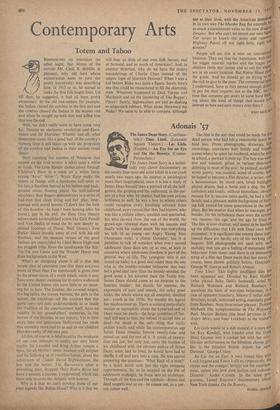Contemporary Arts
Totem and Taboo
REMINISCING on television the other night, that Moses of the movies Mr. Cecil B. deMille .(a
pleasant, wily old bird whose eccentricities seem to turn out pretty lucratively) was describing elementary. In the old two-reelers, for example, the Indian chased the cowboy in the first reel and the cowboy chased the Indian in the second reel and when he caught up with him and killed him that was the end.
Well, we don't really seem to have come very far. Despite an electronic revolution and Euro- vision and Sir Mortimer Wheeler and all, what • sometimes seems like a good half of the country's viewing time is still taken up with the projection of the cowboy and Indian in their ancient ritual dance,
Start counting the number of Westerns that appear on the little screen; it takes quite a while to finish. The Lone Ranger dashes about through Children's Hour in a mask on a white horse crying 'Ay-o! Silver !'; Wyatt Earp walks the streets of Dodge with a handsome half-smile on his lips, a Buntline Special in his holster and back- 'ground music floating about his well-tailored shoulders; Roy Rogers demonstrates to a.series of bad-men that clean living and fair play, inter- spersed with moral lessons ('I don't like the look of this hombre—he hasn't been looking after his horse.), pay in the end; the Zane Gray theatre allows more accomplished actors like Dick Powell and Van Heflin to tread the by now deeply in- dented footsteps of Shane; Walt Disney's Fess Parker blasts bravely away at evil with his old flintlock; and the senecan virtues of the good Indians are exemplified by Chief Brave Eagle and his priggish tribe. Even the quadrupeds like Rin- Tin-Tin and Lassie and the Wonder Horse owe their backgrounds to the West.
What's so intriguing about it all is that this ample slice of television time (for there are even more of them than I've mentioned) is given over :to the preservation of a myth which, while it may 'have some deeper meaning for its native audiences in the United States, can have little or no mean- ing for us here. The frontier, the covered wagon, the log cabin, the craven barman, the girls in the saloon, the round-up—all the counters that this game uses—are only understandable to us inside the tradition of the entertainment itself, have no validity in our grandfathers' memories, in the stories of our families, in our history. Yet in little more than one generation Hollywood has made this unreality more real to us and to our children than the reality of our own past.
All this, of course, is reinforced by the weakness of our own attempts to codify our own latent myths. Sir Lancelot and King Arthur remain a bore, for all Merlin's comic business with eclipses and the lathering up of countless horses; about the adventures of Claude Dural Highwayman, the less said the better; The Buccaneers, after a promising start, dropped. Only Robin Hood has been a success, a success, I understand, which has been able to cross the Atlantic' with honour.
Why is it that we can't develop more of our own legends like Robin Hood? Why is it that we
still hear so little of our own folk heroes, real or fictional, and so much of American? And, in another direction, why do we have the dreary maunderings of Charlie Chan instead of the aseptic logic of Sherlock Holmes? When I was a kid Sexton Blake was quite a figure. Surely here's one that could be resuscitated to fill the electronic maw. Whatever happened to Dick Turpin and Macheath and all the roystering of The Beggar's Opera? Surely, highwaymen are just as dashing as stagecoach robbers. What about Hereward the Wake? We seem to be able to compete, although not at their level, with the American detectivl in its own way 7'he Murder Bag, for example, 1./3 as much entertainment value as the now draggIll Dragnet. But why can't we invent our own SO Car series to knock the noisy and repentiv,e, Highway Patrol off our tight little, right lilt' screens?
People tell me this is now an international business. They say that the Americans, with the far bigger internal market and the bigger Pus' sibilities (with star names and so on) for exP°A,11' are in an easier position. But Robin Hood ma'. the grade. And we should go on trying to tar the rich to give to the poor. The commercial b0Y5' I understand, have in fact earned enough dollarl to pay for their imports; not so the BBC. Isn't time that someone got down to some hard thinit: ing about the kind of things that would 01' interest us here and earn money over there?
JOHN rsiEnA°


































 Previous page
Previous page